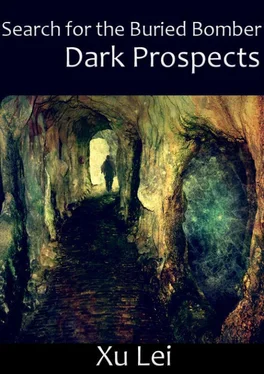Nothing would be made clear that night. We new arrivals were assigned sleeping quarters, three men to a tent. Nighttime on the mountain was deadly cold. There was a stove inside the tent, but it was impossible to sleep. Even if you managed to doze off, the attendant would come to add wood, the wind would rush in, and the cold immediately awoke anyone still sleeping. There was nothing to do but sit up and wait for the light of dawn to break across the sky.
There were two other guys in my tent. One was older. He was born in the late twenties, in Inner Mongolia, and seemed to be rather well known. Everyone called him “Old Cat,” but his real name was Mao Wuyue. I told him it was a good name because he had the same surname as Chairman Mao. The other guy was a sturdy Mongolian from Heilongjiang named Wang Sichuan. He was about my age and dark as coal. Everyone just called him “Bear.” Old Cat never said much. Bear and I would be chatting away while he just sat there puffing on a cigarette and chuckling at us. Who knew what he was thinking about?
Bear was your typical northerner, jovial and outgoing. We soon became as close as brothers. He told me his grandfather’s generation had intermarried with Han Chinese, and the whole family had moved to inner Shanhaiguan to become horse traders during the great westward migration. When the War of Resistance against the Japanese broke out, his father joined the logistical squadron of the Northern Chinese field army, serving as a horse trainer for Luo Ruiqing. After liberation, his father moved back to his hometown in Heilongjiang province and became the manager of a coal mine.
It was because of his father that Wang Sichuan became a prospector, though it wasn’t what he set out to do. When Wang Sichuan was young, China’s key industries were in dire need of resources, making coal a valuable commodity and coal mining an occupation of great importance. Wang Sichuan’s father spent the second half of his life buried deep within the coal mines, emerging only occasionally to return home. It was all he thought about, all he spoke about. Even when he talked in his sleep, he talked about coal. Wang Sichuan’s mother would rail against this obsession, and his parents got into horrible fights, so from an early age Wang Sichuan hated coal. When he grew up, his father wanted him to enter the coal industry. Wang Sichuan firmly refused. His dream was to be a driver in the military, but he lacked the connections. In the end, after living at home for half a year with no job or source of income, he was forced to compromise. He would work for his father so long as his responsibilities had as little to do with coal as possible. That’s how he became a prospector. To his surprise, he found he had a talent for the work and was soon able to attend university thanks to a pro-minority university admissions policy.
Hearing Wang Sichuan’s hatred of coal, I had to laugh. What he said was true. Even though our work was the foundation of the industry, we rarely came into contact with any actual coal mines. Probably no other mining-related job had so little—physically, at least—to do with the mines as ours.
After he’d finished talking about his life and family, Wang Sichuan asked me about my own. In those days, my family’s class was nothing to be proud of, so I just told him we were common farmers and left it at that.
Actually, my grandfather’s generation really could be considered farmers. My ancestors were poor peasants from Hongdong in Shanxi province. People say that, for a short period of time, my grandfather was a bandit and amassed a small amount of property. Because of these holdings, he was reported during the land-reform movement and labeled a counterrevolutionary rich peasant. But my grandfather was stubborn. He took my grandmother, father, and uncle and fled to the South. There, my grandfather made his two sons take a Buddhist monk for a second uncle. Because this monk was considered a poor peasant, my father and uncle were now also ranked as poor peasants. But even though I was considered a poor peasant, my grandfather remained a counterrevolutionary, and that could be dangerous.
Wang Sichuan and I talked about what we thought was going on here, and about the local customs and our hometowns. Wang Sichuan was a northerner and I was a southerner. He was ethnically Mongolian and I was Han Chinese. There were an endless number of things for us to talk about. Both of us had endured our share of hardships, and so a single cold, sleepless night was no great ordeal.
That morning, brigade headquarters dispatched someone to give us a tour of the camp. I think his name was Rong Aiguo. He looked about thirty or forty, but with prospectors it’s always difficult to tell someone’s true age. The harsh elements take a toll on one’s features. And there was something not quite right about this man. Though he escorted us all around the camp, he seemed to be merely going through the motions. He would answer no questions and remained silent whenever one was raised. He told us, for example, that the 723 Project was actually initiated three years ago, that work hadn’t started until this year due to inadequate personnel, but he never said anything about what work was being done here. Everything that left his mouth was mundane day-to-day information like “The canteen is located over here,” or “This is the procedure for going to the bathroom.”
A month passed with no developments whatsoever. We continued to idle away our time at base camp, doing nothing, knowing nothing. No one seemed to be paying any attention to us. After a while, some of the veterans were unable to stand the boredom. They goaded some workers into tracking down Rong Aiguo—several times, in fact—but he always had one excuse or another to avoid us. Slowly, an awareness of the strangeness of our situation crept over us. A contagious anxiety spread throughout the group. A few even began to suspect we’d all been found guilty of some terrible offense and were soon to be executed. Public executions were all too common in those days. I could feel my heart pound in my chest as I listened to these rumors.
It was already fall in Inner Mongolia, and the temperature was dropping fast. As soon as we stepped outside, chill gusts penetrated our bones. We southerners found it particularly hard, but it was tough for everyone. Many began to suffer from nosebleeds. I remember us passing a whole month barely ever leaving the warmth of our stovetop kang beds: chatting, nibbling on steamed corn bread, and using raggedy old socks to wipe the blood from our nostrils.
Then, early one Wednesday morning, semiconscious, we were once again stuffed into a truck and, along with two other vehicles packed full of engineering corpsmen, driven farther into the mountains. By now, the mix of excitement and uncertainty that I had felt at the start of this assignment had changed to full-on fear. Through a gap in the tarp that covered our People’s Liberation Army truck, I stared out at the cliffside plank road we seemed to be driving toward. Beyond, the expanse of mountains and ancient forest extended unbroken into the distance. I looked at the faces of the engineering corpsmen sitting around me. They were expressionless. The atmosphere within the truck had turned deadly serious. None of us spoke. We simply braced ourselves against the vehicle’s interior as it rocked and jolted along, silently awaiting the end of our journey.

CHAPTER 2

Arrival
We wound our way along the saddle ridges twisting through the chain of mountains. In many places the path was just a small gap between trees. The tracks we followed had been built with planks cut from the trees around us. The difference between such temporary measures and real roads, you could feel it in the rattling of your bones. Hours of twisting roads and constant jolts slowly shocked us senseless.
Читать дальше














